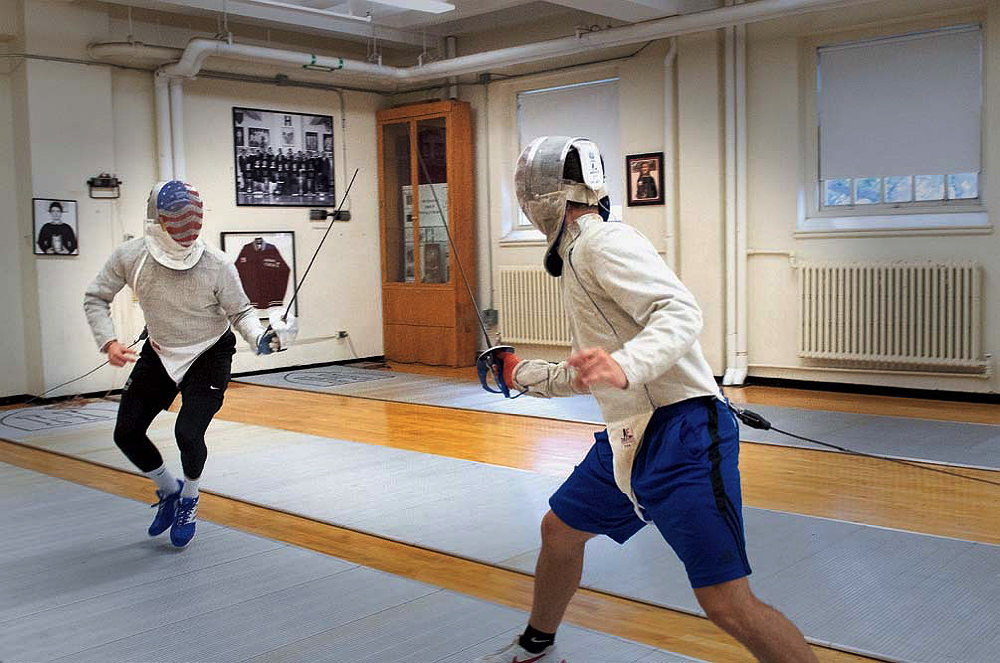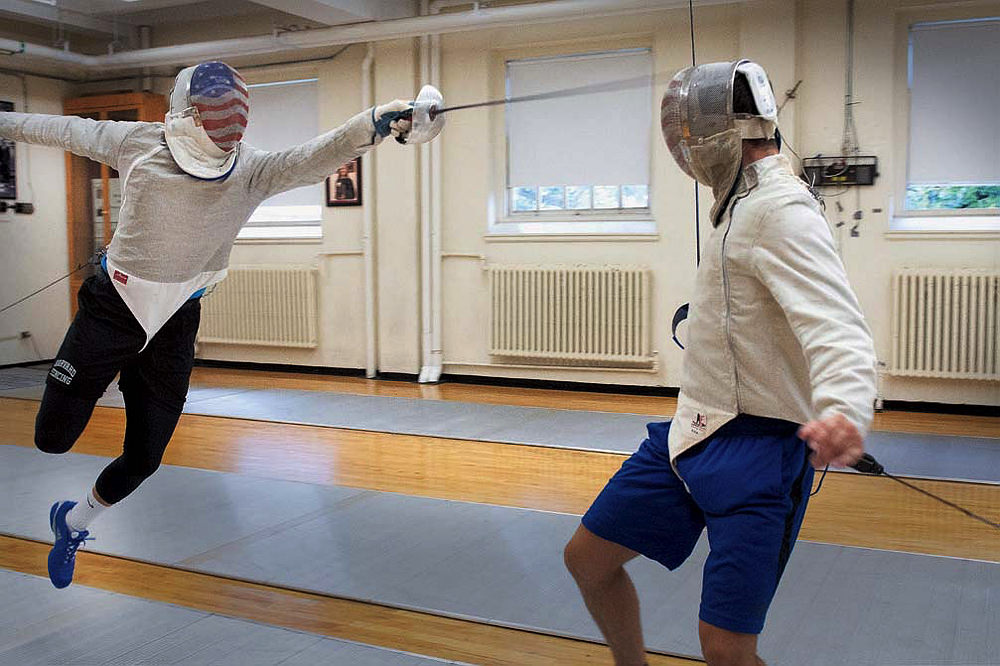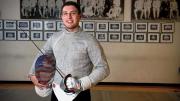Last May, when Eli Dershwitz ’18 (’19) turned in his finals and headed out of Cambridge for the summer, he was the top-ranked men’s saber fencer in the United States. When he returned to campus three months later, he was number one in the world. The time between was a whirlwind for the 22-year-old former Olympian: international competitions in Moscow, Madrid, Havana (where he took first place in the Pan American Fencing Championship), and, finally, the World Championship in Wuxi, China. Blazing through a half-dozen opponents before a hard-fought final bout, Dershwitz walked away with silver. That triumph, in late July, capped a 2017-18 season in which he had already earned three international medals: two golds in Algeria and Italy, and a bronze in South Korea—and the cumulative points from each tournament pushed him to the top of the world rankings.
“It was a big summer,” he allows with a slight smile. He’s trying not to make too big a thing of it—a number-one ranking, he knows, means a target on his back. Plus, he has more work yet to do: one last season with his Harvard teammates—for the second year, Dershwitz is co-captain of the men’s squad, and he’d like to see the team win a NCAA championship. Beyond that lie the 2020 Olympics in Tokyo, which he’ll begin training for full time once he graduates. “I don’t remember the last time a day went by when I didn’t think about the Olympics and getting a gold medal there,” he says. “It’s pretty much what I think about all the time.”
Yet what he’s already accomplished really is a big thing. Dershwitz is only the second American to top the world rankings for men’s saber, and the only one to do it while enrolled full-time in college (he is a history concentrator). He won a U.S. senior men’s championship when he was 18, becoming the youngest ever. “He’s one of those cases where you see an athlete like this, if you’re lucky, once every generation,” says Harvard fencing coach Peter Brand. “I’ve been doing this for 40 years, and I’ve never seen anybody like him.”
Saber is the most fast-paced of fencing’s three weapons, a sprint compared to the marathon of épée and foil. It is a cutting weapon, and opponents can score with both the point and the side of the blade. “That’s what speeds it up,” Dershwitz explains. “Everything is these very quick touches, these minute actions, and everything’s moving so fast. There’s a constant give and take between you and your opponent, how you react in a fraction of a second, and how they react.” Winning requires lightning-quick reflexes and footspeed; it also requires aggression and adaptability and strategic acuity. Fencing as a whole is often referred to as “physical chess,” and saber, Brand says, is the most chess-like of all, “just in the mental toughness it demands.”
Dershwitz’s older brother was the one who introduced him to the sport. Philip Dershwitz, who later fenced for Princeton, learned saber at a day camp near the family’s home in Sherborn, Massachusetts, and liked it so much that he wanted to keep going. He joined a fencing club run by Zoran Tulum, a former champion from Yugoslavia who now coaches the U.S. men’s national saber team (and in the 1980s spent two years on the coaching staff at Harvard). Soon Eli joined his brother there. “As a kid, it was like, I can run around with a metal sword and hit my friends without getting in trouble,” Dershwitz says. “I thought, this is perfect.”


Dershwitz, left, practicing with teammate Daniel Solomon ’22, shows why saber is the sport’s fastest weapon.
Photograph by Stu Rosner
Tulum’s Zeta Fencing became a second home. Housed in an 1880s building in Natick, the place recalls the fencing salles of the Victorian era, with its dark wood paneling and heavy drapes and upholstered benches. It was there that Brand first caught sight of Dershwitz. “Actually, my kid was fencing him,” he says. Dershwitz was eight, Brand’s son was 12, and the boys were battling for first place in a local competition. Looking back now, Brand laughs. “It was something else to behold,” he says. “This little guy, Eli, in there just shrieking.…Frankly, my 12-year-old was a seasoned fencer by then, and he had a real tough time with Eli. It was impressive. I saw him, and I said, ‘Who the hell is this kid?’”
Growing up, Dershwitz also played soccer, basketball, lacrosse, and baseball, but by the time he reached high school, he had decided to go all in on fencing. He was starting to realize how good at it he was, winning not just local tournaments, but bigger competitions too, against fencers from other parts of the country, other parts of the world. At some point, an intense drive took hold. By the time he arrived at Harvard, he was thinking about the Olympics, and took his sophomore year off to train full-time for the 2016 Games in Rio de Janeiro. He made the team, as its youngest member, but lost in his first bout, against a veteran fencer from Belgium. “He was inexperienced,” Brand says, “and the pressure was enormous.” Dershwitz came home still hungry.
Not for the first time. In 2014, at the junior world championship in Bulgaria, he came in ranked first. He’d been up and down in that tournament during the previous two years—losing badly when he was supposed to do well, winning medals when it wasn’t expected—but that year, he thought, would be his year. He’d trained hard; he felt focused and ready. “And then I got demolished,” he says. “I finished, I don’t know, in probably 100th place.” For several weeks, he moped inconsolably. Then he sat down with Tulum, his coach, and made a promise. “I told him that in the future, if I lose to someone, it might be because they’re better than me, or faster than me, or more experienced than me. But I will never again in my life lose a bout because the other person worked harder than me. I promised him that right there. I don’t know if he remembers it. We were sitting at a restaurant called the Dolphin in Natick, Massachusetts.” The next year, Dershwitz’s last before aging out of the tournament, he won gold.
Last season, with its string of medals (including an individual NCAA title, his second in a row), Dershwitz felt, maybe for the first time, that he was performing consistently well throughout. “In those six weeks leading up to the world championship, I was feeling the best I have in my entire life, mentally and physically,” he says. “And then the day came and I got nervous like I’ve never been nervous before.” The moment of highest pressure was perhaps the quarterfinal bout against Hungarian Áron Szilágyi, the 2016 Olympic gold medalist, because whoever won that contest was guaranteed a medal. Dershwitz fell behind early but fought his way back; more than once he seemed almost to take flight as he raced and then leapt across the strip. After another comeback win in the semis, he faced veteran South Korean fencer Kim Jung-hwan, an Olympic medalist whom he’d beaten a few months earlier, in the finals. Kim won, but Dershwitz fenced well.
Strangely, though, he doesn’t really remember that. If you ask him to describe what he was thinking or doing during one bout or another, he can’t. “I’d say that most of the big tournaments in my career, I have no recollection of the actual in-person experience,” he says. Something else—adrenaline? training? the unconscious?—takes over completely: “There have been tournaments where I lose, like, 14 hours of my life.” Instead, Dershwitz watches the video later. And what he sees—in his own moves, which he can recognize but not remember, and in the countermoves of his opponent—is something he also sees in his Harvard teammates when he watches them train, rehearsing again and again the minute complexities of footwork and bladework: “Fencing,” he says, “is a beautiful sport.”









